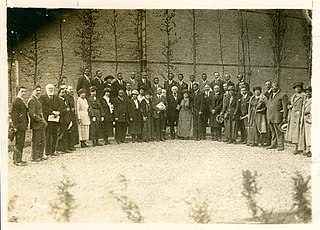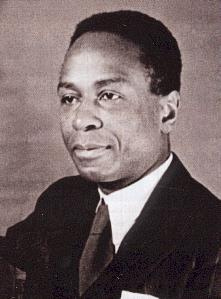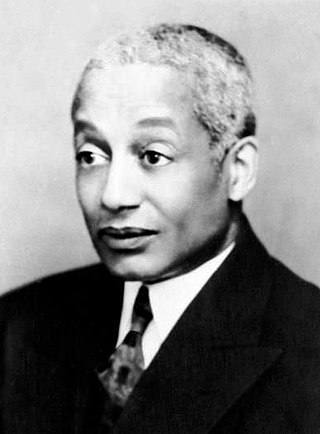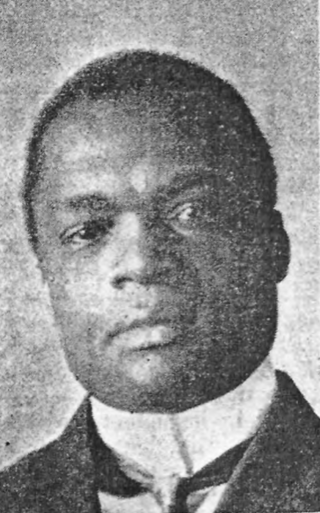Related Research Articles

The Universal Negro Improvement Association and African Communities League (UNIA-ACL) is a black nationalist fraternal organization founded by Marcus Garvey, a Jamaican immigrant to the United States, and Amy Ashwood Garvey. The Pan-African organization enjoyed its greatest strength in the 1920s, and was influential prior to Garvey's deportation to Jamaica in 1927. After that its prestige and influence declined, but it had a strong influence on African-American history and development. The UNIA was said to be "unquestionably, the most influential anticolonial organization in Jamaica prior to 1938," according to Honor Ford-Smith.

The Pan-African Congress was a series of eight meetings which took place on the back of the Pan-African Conference which took place in Paris in 1900. The Pan-African Congress gained a reputation as a peacemaker for decolonization in Africa and in the West Indies. It made a significant advance for the Pan-African cause. One of the group's major demands was to end colonial rule and racial discrimination. It stood against imperialism and it demanded human rights and equality of economic opportunity. The manifesto given by the Pan-African Congress included the political and economic demands of the Congress for a new world context of international cooperation and to address the issues facing Africa as a result of European colonization of most of the continent.

George Padmore, born Malcolm Ivan Meredith Nurse, was a leading Pan-Africanist, journalist, and author. He left his native Trinidad in 1924 to study medicine in the United States, where he also joined the Communist Party.

John Richard Archer was a British politician and political activist. In 1913 he was elected Mayor of Battersea, becoming the first black mayor of a borough in London. He was a notable Pan-Africanist and the founding president of the African Progress Union.
The League of Coloured Peoples (LCP) was a British civil-rights organization that was founded in 1931 in London by Jamaican-born physician and campaigner Harold Moody with the goal of racial equality around the world, a primary focus being on black rights in Britain. In 1933, the organization began publication of the civil-rights journal, The Keys. The LCP was a powerful civil-rights force until its dissolution in 1951.

The Antipodeans were a group of Australian modern artists who asserted the importance of figurative art, and protested against abstract expressionism. Though they staged but a single exhibition in Melbourne during August 1959, they were noted internationally.

James Boggs was an American political activist, auto worker and author. He was married to philosopher activist Grace Lee Boggs for forty years until his death.

Sue Bailey Thurman was an American author, lecturer, historian and civil rights activist. She was the first non-white student to earn a bachelor's degree in music from Oberlin College, Ohio. She briefly taught at the Hampton Institute in Virginia, before becoming involved in international work with the YWCA in 1930. During a six-month trip through Asia in the mid-1930s, Thurman became the first African-American woman to have an audience with Mahatma Gandhi. The meeting with Gandhi inspired Thurman and her husband, theologian Howard Thurman, to promote non-violent resistance as a means of creating social change, bringing it to the attention of a young preacher, Martin Luther King Jr. While she did not actively protest during the Civil Rights Movement, she served as spiritual counselors to many on the front lines, and helped establish the first interracial, non-denominational church in the United States.

Alain LeRoy Locke was an American writer, philosopher, educator, and patron of the arts. Distinguished in 1907 as the first African-American Rhodes Scholar, Locke became known as the philosophical architect —the acknowledged "Dean"— of the Harlem Renaissance. He is frequently included in listings of influential African Americans. On March 19, 1968, the Rev. Dr. Martin Luther King Jr. proclaimed: "We're going to let our children know that the only philosophers that lived were not Plato and Aristotle, but W. E. B. Du Bois and Alain Locke came through the universe."

Anna Arnold Hedgeman was an African-American civil rights leader, politician, educator, and writer. Under President Harry Truman, Hedgeman served as executive director of the National Council for a Permanent Fair Employment Practices Commission, having worked on his presidential campaign. She was also appointed to the cabinet of New York City mayor Robert F. Wagner, Jr., becoming the first African-American woman to hold a cabinet post in New York. Hedgeman was a major advocate for both minorities and the poor in New York City. She also served as a consultant for many companies and entities on racial issues, and late in her life founded Hedgeman Consultant Services. She was among the organizers of the 1963 March on Washington. Throughout her many years involved in the civil rights movement, she befriended Dorothy Height.

The Indian Workers' Association (IWA) is a political organisation in Great Britain which consists of Indian immigrants to Britain and their descendants. IWA branches are organised in some major cities such as Birmingham and London. As one of the oldest and most active groups of immigrants, the organisation has been working in the fields of politics, race relations, industrial relations and social welfare, as well as many cultural issues. At the forefront of the struggle within trade unions, it has campaigned tirelessly against racism and on civil liberties issues.

Daisy Elizabeth Adams Lampkin was an American suffragist, civil rights activist, organization executive, and community practitioner whose career spanned over half a century. Lampkin’s effective skills as an orator, fundraiser, organizer, and political activist guided the work being conducted by the National Association of Colored Women (NACW); National Association for the Advancement of Colored People (NAACP); National Council of Negro Women and other leading civil rights organizations of the Progressive Era.

Randolph T. Blackwell was an American activist of the Civil Rights Movement, serving in Martin Luther King Jr.'s Southern Christian Leadership Conference, amongst other organizations. Coretta Scott King described him as an "unsung giant" of nonviolent social change.

The Barbados Cricket Buckle is a repoussé engraving on a belt buckle of a slave playing cricket in Barbados circa 1780–1810. It is believed to be the only known image of a slave playing cricket and is thought to be the oldest surviving artifact depicting cricket outside the British Isles.

James Desmond Buckle was a political activist, journalist, trade unionist and Communist born in the British colony of the Gold Coast. Described as "an African communist in Britain", he may have been the first African to join the British Communist Party.
Chris Braithwaite, also known as Chris Jones, was a black Barbadian who was leader of the Colonial Seamen's Association in the 1930s.
Marika Sherwood is a Hungarian-born historian, researcher, educator and author based in England. She is a co-founder of the Black and Asian Studies Association.

The Communist Party of Great Britain (CPGB) was the largest communist organisation in Britain and was founded in 1920 through a merger of several smaller Marxist groups. Many miners joined the CPGB in the 1926 general strike. In 1930, the CPGB founded the Daily Worker. In 1936, members of the party were present at the Battle of Cable Street, helping organise resistance against the British Union of Fascists. In the Spanish Civil War the CPGB worked with the USSR to create the British Battalion of the International Brigades, which party activist Bill Alexander commanded.

The African Association, known as the Pan-African Association after 1900, was an organization formed by leaders of African descent to "promote and protect the interests of all subjects claiming African descent, wholly or in part, in British colonies and other place, especially Africa, by circulating accurate information on all subjects affecting their rights and privileges as subjects of the British Empire, by direct appeals to the Imperial and local Governments." Henry Sylvester Williams initiated the creation of the African Association, which was formalized on September 14, 1897, at its headquarters in London. The Association is best known for organizing the First Pan-African Conference, which took place in London in July 1900.

Peter Blackman (1909–1993) was a Caribbean communist, scholar, civil rights activist, and Christian missionary. After challenging a racist rule in which white missionaries earned more than their black counterparts, Blackman resigned as a priest and dedicated himself to both communism and black civil rights activism. He was a key member of the Negro Welfare Association and the League of Coloured Peoples, and an active member of the Communist Party of Great Britain (CPGB). During his career as a communist party activist, he became close friends with American civil rights leaders Paul Robeson and W. E. B. Du Bois. Blackman worked as a radio broadcaster for the British Broadcasting Company (BBC) during the Second World War for their Caribbean services; however, in 1950 he was fired from his job for having communist beliefs. Afterwards, he joined the National Union of Railwaymen (NUR) and volunteered to write letters for people with learning disabilities. In his later life he dedicated his time to writing poetry.
References
- 1 2 3 4 5 Hakim Adi (2007). "Negro Welfare Association". In David Dabydeen; John Gilmore; Cecily Jones (eds.). The Oxford Companion to Black British History. Oxford University Press. ISBN 978-0-19-923894-1.
- 1 2 Marc Matera (2015). Black London: The Imperial Metropolis and Decolonization in the Twentieth Century. University of California Press. p. 46. ISBN 978-0-520-95990-3.